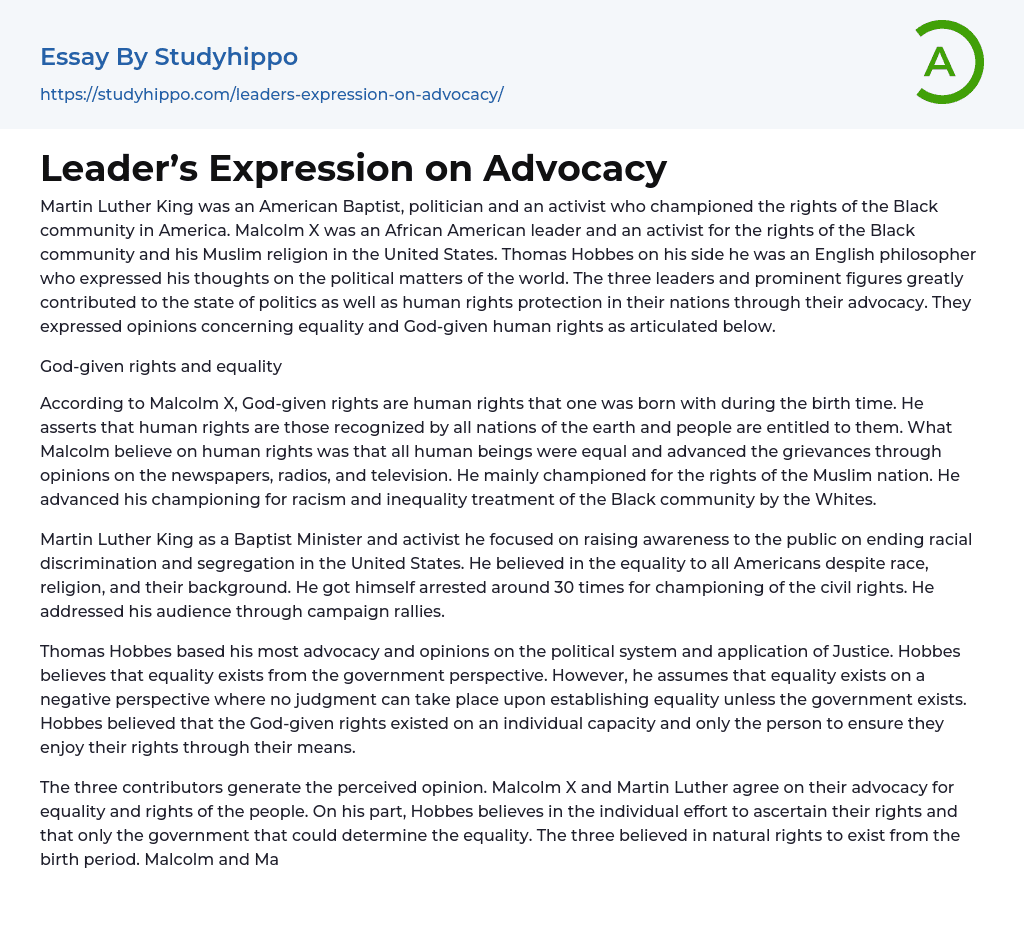Martin Luther King was an American Baptist, politician, and activist who dedicated himself to advocating for the civil rights of the Black community in America.
Both Malcolm X and Thomas Hobbes were influential figures in their respective nations, advocating for political rights and human equality. Malcolm X, an African American leader and activist, dedicated his life to fighting for the rights of the Black community and promoting his Muslim religion. On the other hand, Thomas Hobbes, an English philosopher, expressed his thoughts on political matters. Despite their different backgrounds and areas of focus, both leaders shared a common belief in equality and the concept of God-given human rights.
The Belief in God-given Rights and Equality
Malcolm X firmly believed that God-given rights are inherent to every individual from birth. He emphasized that these universal rights should be recognized by all
...nations and granted to every person without discrimination or prejudice.
Both Malcolm and Martin were advocates for equality and human rights, using media platforms to express their concerns. Malcolm specifically focused on advocating for the Muslim community and addressing racism and unequal treatment of Black individuals by White individuals. On the other hand, Martin Luther King, a Baptist Minister and activist, aimed to raise awareness about ending racial discrimination and segregation in the United States. He advocated for equality among all Americans regardless of race, religion, or background. King's commitment to the civil rights movement led to his arrest approximately 30 times.
In his campaign rallies, Thomas Hobbes discussed the political system and the application of justice. He contended that equality is perceived by the government, but only in a negative sense where judgment on equality relies on the existenc
of a government.
Hobbes, Malcolm X, and Martin Luther held different perspectives on rights and equality. According to Hobbes, individual rights were bestowed by God and it was each person's responsibility to ensure their enjoyment through personal efforts. Conversely, both Malcolm X and Martin Luther concurred that advocating for equality and people's rights was crucial. They believed that the law alone could not guarantee equality and emphasized the significant role of government control in their advocacy. However, Hobbes asserted that true equality could only be established through the government. Despite their divergent views, all three agreed on the inherent nature of these rights from birth.
Work Cited
- Metz, Shannon Marie. "Dr. Martin Luther King, Jr. and MalcolmX: The Power and Legacy of Prophetic Discourse in the Civil Rights Movement." (2005).
- The Role of Equality in the Formation of Government According to Hobbes and Locke Bradley Farless. (2016).
- Caste System essays
- Citizenship essays
- Civil Society essays
- Community essays
- Culture essays
- Deviance essays
- Discourse Community essays
- Female essays
- Filipino People essays
- Igbo People essays
- Indigenous Australians essays
- Indigenous Peoples essays
- Men essays
- Middle Class essays
- Minority Group essays
- Modern Society essays
- Popularity essays
- Social Control essays
- Social Institution essays
- Social Justice essays
- Social Norms essays
- Social Responsibility essays
- Socialization essays
- The nation essays
- 1920S essays
- 1950S essays
- 1960S essays
- 19Th Century essays
- 20Th Century essays
- Ancient Greece essays
- Bravery essays
- British Empire essays
- Civilization essays
- Colonialism essays
- Declaration of Independence essays
- Evidence essays
- Genocide essays
- Gilded Age essays
- Historical Figures essays
- Historiography essays
- History of the United States essays
- Letter from Birmingham Jail essays
- Louisiana Purchase essays
- Nazi Germany essays
- Rebellion essays
- Revolution essays
- Roman Empire essays
- Russian Empire essays
- The Columbian Exchange essays
- Vikings essays




